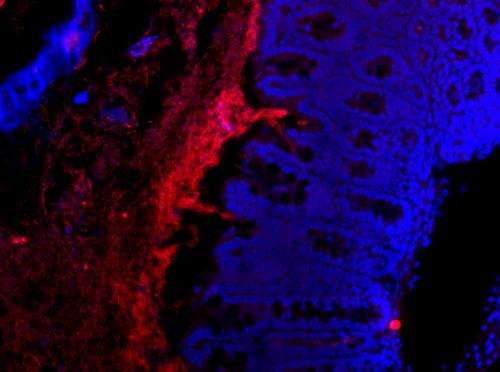Good bacteria in the intestine prevent diabetes, study finds

All humans have enormous numbers of bacteria and other micro-organisms (10 to 14) in the lower intestine. In fact our bodies contain about ten times more bacteria than our own cells and these tiny passengers are extremely important for our health. They help us digest our food and provide us with energy and vitamins. These "friendly" commensal bacteria in the intestine help to stop the "bad guys" such as Salmonella that cause infections, taking hold. Even the biochemical reactions that build up and maintain our bodies come from our intestinal bacteria as well as our own cells.
Pretty important that we get along with these little bacterial friends... definitely. But as in all beautiful relationships, things can sometimes turn sour. If the bacteria in the intestine become unbalanced, inflammation and damage can occur at many different locations in the body. The best known of these is the intestine itself: the wrong intestinal bacteria can trigger Crohn's disease and ulcerative colitis. The liver also becomes damaged when intestinal bacteria are unbalanced.
Research groups led by Professor Jayne Danska at the Sick Children's Hospital of the University of Toronto and Professor Andrew Macpherson in the Clinic for Visceral Surgery and Medicine at the Inselspital and the University of Bern have now shown that the influence of the intestinal bacteria extends even deeper inside the body to influence the likelihood of getting diabetes. In children and young people, diabetes is caused by the immune cells of the body damaging the special cells in the pancreas that produce the hormone insulin. By chance, 30 years ago, before the development of genetic engineering techniques, Japanese investigators noticed that a strain of NOD laboratory mice tended to get diabetes. These mice (also by chance) have many of the same genes that make some humans susceptible to the disease. With the help of the special facilities of the University of Bern and in Canada, these teams have been able to show that the intestinal bacteria, especially in male mice, can produce biochemicals and hormones that stop diabetes developing.
Diabetes in young people is becoming more and more frequent, and doctors even talk about a diabetes epidemic. This increase in diabetic disease has happened over the last 40 years as our homes and environment have become cleaner and more hygienic. At the moment, once a child has diabetes, he or she requires life-long treatment. "We hope that our new understanding of how intestinal bacteria may protect susceptible children from developing diabetes, will allow us to start to develop new treatments to stop children getting the disease", says Andrew Macpherson of the University Bern.
More information: Markle, J. et al. Sex-specific differences in the gut microbiome drive testosterone-dependent protection from autoimmunity that is transferable by early life conditioning in the NOD mouse, Science Express, 17. Januar 2013, DOI: 10.1126/science.1233521

















